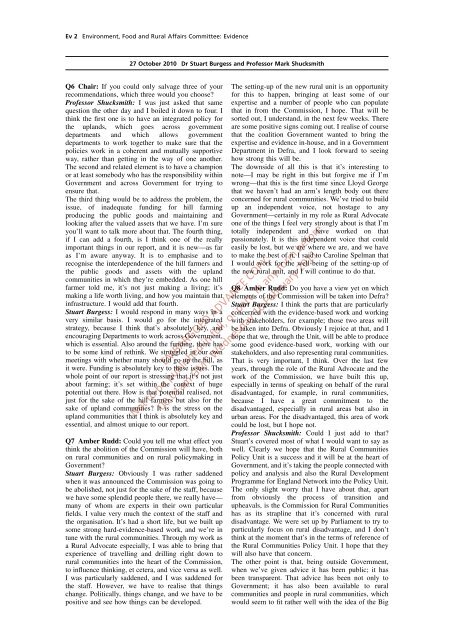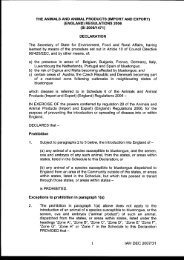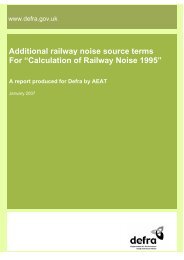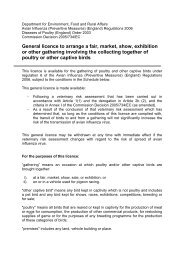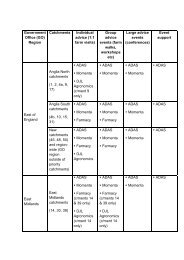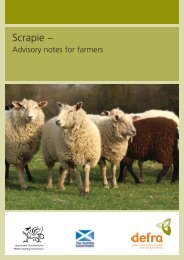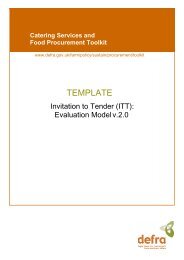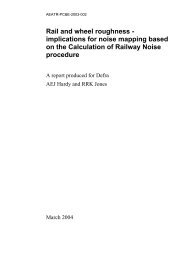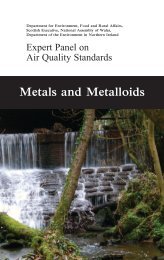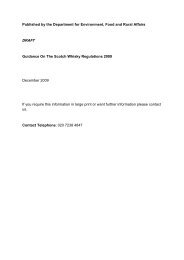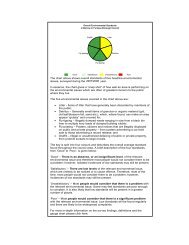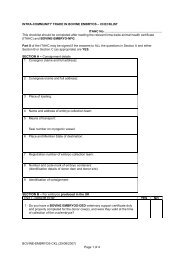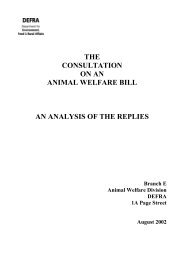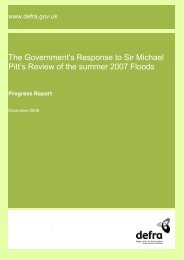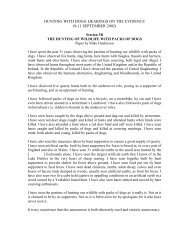Farming in the Uplands - ARCHIVE: Defra
Farming in the Uplands - ARCHIVE: Defra
Farming in the Uplands - ARCHIVE: Defra
You also want an ePaper? Increase the reach of your titles
YUMPU automatically turns print PDFs into web optimized ePapers that Google loves.
Ev 2 Environment, Food and Rural Affairs Committee: Evidence<br />
27 October 2010 Dr Stuart Burgess and Professor Mark Shucksmith<br />
Q6 Chair: If you could only salvage three of your<br />
recommendations, which three would you choose?<br />
Professor Shucksmith: I was just asked that same<br />
question <strong>the</strong> o<strong>the</strong>r day and I boiled it down to four. I<br />
th<strong>in</strong>k <strong>the</strong> first one is to have an <strong>in</strong>tegrated policy for<br />
<strong>the</strong> uplands, which goes across government<br />
departments and which allows government<br />
departments to work toge<strong>the</strong>r to make sure that <strong>the</strong><br />
policies work <strong>in</strong> a coherent and mutually supportive<br />
way, ra<strong>the</strong>r than gett<strong>in</strong>g <strong>in</strong> <strong>the</strong> way of one ano<strong>the</strong>r.<br />
The second and related element is to have a champion<br />
or at least somebody who has <strong>the</strong> responsibility with<strong>in</strong><br />
Government and across Government for try<strong>in</strong>g to<br />
ensure that.<br />
The third th<strong>in</strong>g would be to address <strong>the</strong> problem, <strong>the</strong><br />
issue, of <strong>in</strong>adequate fund<strong>in</strong>g for hill farm<strong>in</strong>g<br />
produc<strong>in</strong>g <strong>the</strong> public goods and ma<strong>in</strong>ta<strong>in</strong><strong>in</strong>g and<br />
look<strong>in</strong>g after <strong>the</strong> valued assets that we have. I’m sure<br />
you’ll want to talk more about that. The fourth th<strong>in</strong>g,<br />
if I can add a fourth, is I th<strong>in</strong>k one of <strong>the</strong> really<br />
important th<strong>in</strong>gs <strong>in</strong> our report, and it is new—as far<br />
as I’m aware anyway. It is to emphasise and to<br />
recognise <strong>the</strong> <strong>in</strong>terdependence of <strong>the</strong> hill farmers and<br />
<strong>the</strong> public goods and assets with <strong>the</strong> upland<br />
communities <strong>in</strong> which <strong>the</strong>y’re embedded. As one hill<br />
farmer told me, it’s not just mak<strong>in</strong>g a liv<strong>in</strong>g; it’s<br />
mak<strong>in</strong>g a life worth liv<strong>in</strong>g, and how you ma<strong>in</strong>ta<strong>in</strong> that<br />
<strong>in</strong>frastructure. I would add that fourth.<br />
Stuart Burgess: I would respond <strong>in</strong> many ways <strong>in</strong> a<br />
very similar basis. I would go for <strong>the</strong> <strong>in</strong>tegrated<br />
strategy, because I th<strong>in</strong>k that’s absolutely key, and<br />
encourag<strong>in</strong>g Departments to work across Government,<br />
which is essential. Also around <strong>the</strong> fund<strong>in</strong>g, <strong>the</strong>re has<br />
to be some k<strong>in</strong>d of reth<strong>in</strong>k. We struggled <strong>in</strong> our own<br />
meet<strong>in</strong>gs with whe<strong>the</strong>r many should go up <strong>the</strong> hill, as<br />
it were. Fund<strong>in</strong>g is absolutely key to <strong>the</strong>se issues. The<br />
whole po<strong>in</strong>t of our report is stress<strong>in</strong>g that it’s not just<br />
about farm<strong>in</strong>g; it’s set with<strong>in</strong> <strong>the</strong> context of huge<br />
potential out <strong>the</strong>re. How is that potential realised, not<br />
just for <strong>the</strong> sake of <strong>the</strong> hill farmers but also for <strong>the</strong><br />
sake of upland communities? It is <strong>the</strong> stress on <strong>the</strong><br />
upland communities that I th<strong>in</strong>k is absolutely key and<br />
essential, and almost unique to our report.<br />
Q7 Amber Rudd: Could you tell me what effect you<br />
th<strong>in</strong>k <strong>the</strong> abolition of <strong>the</strong> Commission will have, both<br />
on rural communities and on rural policymak<strong>in</strong>g <strong>in</strong><br />
Government?<br />
Stuart Burgess: Obviously I was ra<strong>the</strong>r saddened<br />
when it was announced <strong>the</strong> Commission was go<strong>in</strong>g to<br />
be abolished, not just for <strong>the</strong> sake of <strong>the</strong> staff, because<br />
we have some splendid people <strong>the</strong>re, we really have—<br />
many of whom are experts <strong>in</strong> <strong>the</strong>ir own particular<br />
fields. I value very much <strong>the</strong> context of <strong>the</strong> staff and<br />
<strong>the</strong> organisation. It’s had a short life, but we built up<br />
some strong hard-evidence-based work, and we’re <strong>in</strong><br />
tune with <strong>the</strong> rural communities. Through my work as<br />
a Rural Advocate especially, I was able to br<strong>in</strong>g that<br />
experience of travell<strong>in</strong>g and drill<strong>in</strong>g right down to<br />
rural communities <strong>in</strong>to <strong>the</strong> heart of <strong>the</strong> Commission,<br />
to <strong>in</strong>fluence th<strong>in</strong>k<strong>in</strong>g, et cetera, and vice versa as well.<br />
I was particularly saddened, and I was saddened for<br />
<strong>the</strong> staff. However, we have to realise that th<strong>in</strong>gs<br />
change. Politically, th<strong>in</strong>gs change, and we have to be<br />
positive and see how th<strong>in</strong>gs can be developed.<br />
The sett<strong>in</strong>g-up of <strong>the</strong> new rural unit is an opportunity<br />
for this to happen, br<strong>in</strong>g<strong>in</strong>g at least some of our<br />
expertise and a number of people who can populate<br />
that <strong>in</strong> from <strong>the</strong> Commission, I hope. That will be<br />
sorted out, I understand, <strong>in</strong> <strong>the</strong> next few weeks. There<br />
are some positive signs com<strong>in</strong>g out. I realise of course<br />
that <strong>the</strong> coalition Government wanted to br<strong>in</strong>g <strong>the</strong><br />
expertise and evidence <strong>in</strong>-house, and <strong>in</strong> a Government<br />
Department <strong>in</strong> <strong>Defra</strong>, and I look forward to see<strong>in</strong>g<br />
how strong this will be.<br />
The downside of all this is that it’s <strong>in</strong>terest<strong>in</strong>g to<br />
note—I may be right <strong>in</strong> this but forgive me if I’m<br />
wrong—that this is <strong>the</strong> first time s<strong>in</strong>ce Lloyd George<br />
that we haven’t had an arm’s length body out <strong>the</strong>re<br />
concerned for rural communities. We’ve tried to build<br />
up an <strong>in</strong>dependent voice, not hostage to any<br />
Government—certa<strong>in</strong>ly <strong>in</strong> my role as Rural Advocate<br />
one of <strong>the</strong> th<strong>in</strong>gs I feel very strongly about is that I’m<br />
totally <strong>in</strong>dependent and have worked on that<br />
passionately. It is this <strong>in</strong>dependent voice that could<br />
easily be lost, but we are where we are, and we have<br />
to make <strong>the</strong> best of it. I said to Carol<strong>in</strong>e Spelman that<br />
I would work for <strong>the</strong> well-be<strong>in</strong>g of <strong>the</strong> sett<strong>in</strong>g-up of<br />
<strong>the</strong> new rural unit, and I will cont<strong>in</strong>ue to do that.<br />
Q8 Amber Rudd: Do you have a view yet on which<br />
elements of <strong>the</strong> Commission will be taken <strong>in</strong>to <strong>Defra</strong>?<br />
Stuart Burgess: I th<strong>in</strong>k <strong>the</strong> parts that are particularly<br />
concerned with <strong>the</strong> evidence-based work and work<strong>in</strong>g<br />
with stakeholders, for example; those two areas will<br />
be taken <strong>in</strong>to <strong>Defra</strong>. Obviously I rejoice at that, and I<br />
hope that we, through <strong>the</strong> Unit, will be able to produce<br />
some good evidence-based work, work<strong>in</strong>g with our<br />
stakeholders, and also represent<strong>in</strong>g rural communities.<br />
That is very important, I th<strong>in</strong>k. Over <strong>the</strong> last few<br />
years, through <strong>the</strong> role of <strong>the</strong> Rural Advocate and <strong>the</strong><br />
work of <strong>the</strong> Commission, we have built this up,<br />
especially <strong>in</strong> terms of speak<strong>in</strong>g on behalf of <strong>the</strong> rural<br />
disadvantaged, for example, <strong>in</strong> rural communities,<br />
because I have a great commitment to <strong>the</strong><br />
disadvantaged, especially <strong>in</strong> rural areas but also <strong>in</strong><br />
urban areas. For <strong>the</strong> disadvantaged, this area of work<br />
could be lost, but I hope not.<br />
Professor Shucksmith: Could I just add to that?<br />
Stuart’s covered most of what I would want to say as<br />
well. Clearly we hope that <strong>the</strong> Rural Communities<br />
Policy Unit is a success and it will be at <strong>the</strong> heart of<br />
Government, and it’s tak<strong>in</strong>g <strong>the</strong> people connected with<br />
policy and analysis and also <strong>the</strong> Rural Development<br />
Programme for England Network <strong>in</strong>to <strong>the</strong> Policy Unit.<br />
The only slight worry that I have about that, apart<br />
from obviously <strong>the</strong> process of transition and<br />
upheavals, is <strong>the</strong> Commission for Rural Communities<br />
has as its strapl<strong>in</strong>e that it’s concerned with rural<br />
disadvantage. We were set up by Parliament to try to<br />
particularly focus on rural disadvantage, and I don’t<br />
th<strong>in</strong>k at <strong>the</strong> moment that’s <strong>in</strong> <strong>the</strong> terms of reference of<br />
<strong>the</strong> Rural Communities Policy Unit. I hope that <strong>the</strong>y<br />
will also have that concern.<br />
The o<strong>the</strong>r po<strong>in</strong>t is that, be<strong>in</strong>g outside Government,<br />
when we’ve given advice it has been public; it has<br />
been transparent. That advice has been not only to<br />
Government; it has also been available to rural<br />
communities and people <strong>in</strong> rural communities, which<br />
would seem to fit ra<strong>the</strong>r well with <strong>the</strong> idea of <strong>the</strong> Big<br />
EMBARGOED ADVANCE COPY:<br />
Not to be published <strong>in</strong> full, or part, <strong>in</strong> any form before<br />
00.01am GMT Wednesday 16 February 2011


